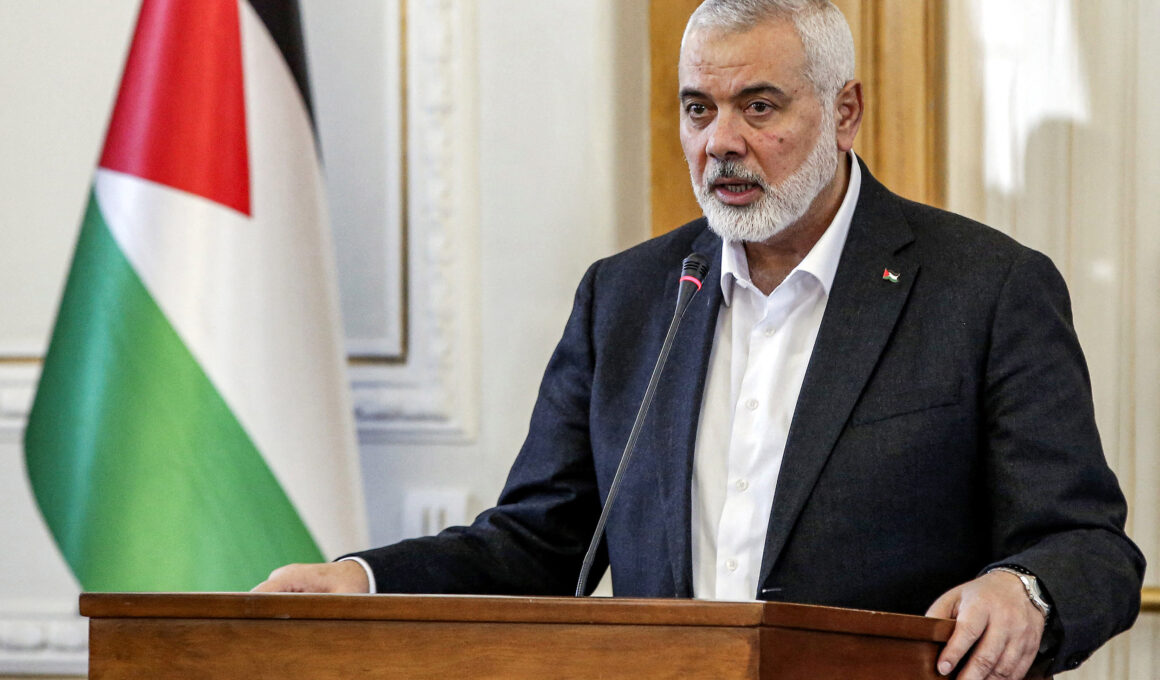Hamas needs a new political leader after the killing of its political bureau chief, Ismail Haniyeh, following the swearing-in ceremony for newly elected Iranian President Masoud Pezeshkian on Tuesday.
Israel has not claimed responsibility for the Haniyeh’s death, but it has sworn to kill Hamas leaders since the deadly October 7 attacks. Haniyeh played a significant role for Hamas, leading its negotiations with Israel and the West.
Speculation has been rife about Haniyeh’s successor. Three names floating around regional media are Khaled Meshaal, a founding member of Hamas and its former political bureau chief; Khalil al-Hayya, who often appears in the media as a spokesperson for Hamas; and Mousa Abu Marzouk, who also helped found Hamas.
Meshaal is the name that comes up most often, and was mentioned to Newsweek by Khaled Elgindy, a senior fellow at the Middle East Institute and director of its Program on Palestine and Israeli-Palestinian Affairs.
“I think Meshaal is most likely because he has also served in that post and, for a time, he was kind of top dog,” Elgindy said.
Similarly, Burcu Ozcelik, a senior research fellow for Middle East Security at the London-based Royal United Services Institute (RUSI) think tank, told Newsweek: “Khaled Meshaal is a founding member of Hamas and is expected to replace Haniyeh as the chief political leader of Hamas.”
He has also been named as a possible successor by Al Jazeera, a network that covers the Middle East and North Africa.
Meshaal rose in the ranks of Hamas after surviving an assassination attempt in Amman, Jordan, in 1997. He was born in the West Bank but did not grow up in Gaza, as he and his family moved to Kuwait after the Six-Day War in 1967.
In 2010, when Meshaal was at the height of his power within Hamas, he spoke with Newsweek. When asked what would need to happen for Hamas to stop using violence, he answered: “I’m a physicist. And I believe in the equations of physics and mathematics. Therefore I respect the laws of math and physics because they’re direct. Very simply, there is occupation and it calls for resistance. When does resistance stop? When the occupation is finished.”
But Meshaal and Abu Marzouk not growing up in Gaza could be a problem, Elgindy told Newsweek.
“They are not from Gaza,” he said. “They don’t have the connections and the networks and the cache with the leadership inside Gaza to influence them. So they’re going to be one step more removed than Haniyeh.”
Haniyeh grew up in Gaza and led Hamas to election victory over Fatah in 2006. He left in 2019 when he began taking up work in diplomacy with countries who were still prepared to work with him.
However, this could be mitigated by the fact that, as Ozcelik told Newsweek: “The political and diplomatic leadership and deputies are principally based outside of Gaza, tasked with network-building and finances of the organization.”
Meanwhile, al-Hayya, who is another option, is serving as deputy to Yahya Ibrahim Hassan Sinwar, the leader of Hamas’ military wing. He was being looked at as a possible successor to Haniyeh once his term was finished.
Abu Marzouk has had a significant career in international politics. He began in the United Arab Emirates and helped found institutions in the U.S. in the late 90s. He spent 22 months in a Manhattan jail on suspicion of terrorism before he was eventually deported to Jordan.
“I would expect that we will get clarity on a successor in fairly short order because Hamas will want to project normalcy, that they’re unfazed, that they’ve dealt with before and have internal mechanisms in place,” Elgindy said.
Uncommon Knowledge
Newsweek is committed to challenging conventional wisdom and finding connections in the search for common ground.
Newsweek is committed to challenging conventional wisdom and finding connections in the search for common ground.







